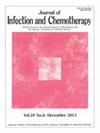Short-course treatment for community-acquired pneumonia in adults aged less than 65 years in Japan: A descriptive study using large healthcare claims database
IF 1.9
4区 医学
Q3 INFECTIOUS DISEASES
引用次数: 0
Abstract
Introduction
In community-acquired pneumonia (CAP), short-course treatment is not inferior in effectiveness compared to conventional treatment durations, and clinical guidelines recommend 5–7-day-long treatments. However, it remains unclear how widely this practice is adopted in Japan. This study aimed to clarify the treatment duration of CAP in Japan using a large healthcare claims database.
Methods
We used health insurance claims data provided by JMDC Inc. (Tokyo, Japan) and included patients aged 18–64 years diagnosed with CAP who began antibiotic treatment between January 1, 2013, and December 31, 2022. Short-course treatment was defined as ≤ 7 d. Analyses were conducted separately for inpatient and outpatient cases, and the annual trends were also investigated.
Results
Overall, 25,572 patients (3367 inpatients and 22,205 outpatients) were included in the analysis. Short-course treatment was administered to 1087 (32 %) inpatients and 15,614 (70 %) outpatients. The proportion of short-course treatments during the 10-year study period was 31–35 % for inpatient cases and 67–72 % for outpatient cases, with no marked changes over the years.
Conclusions
The proportion of inpatients receiving short-course treatments for CAP was low. In Japan, especially for inpatient cases, further efforts are required to optimize the duration of CAP treatment.
日本65岁以下成人社区获得性肺炎的短期治疗:一项使用大型医疗索赔数据库的描述性研究
在社区获得性肺炎(CAP)中,短期治疗的有效性并不亚于常规治疗,临床指南推荐5 - 7天的治疗。然而,目前尚不清楚这种做法在日本的普及程度。本研究旨在利用大型医疗索赔数据库阐明日本CAP的治疗持续时间。方法我们使用JMDC公司(东京,日本)提供的健康保险索赔数据,纳入了年龄在18-64岁,诊断为CAP的患者,他们在2013年1月1日至2022年12月31日期间开始抗生素治疗。短期治疗定义为≤7 d。住院和门诊病例分别进行分析,并调查年度趋势。结果共纳入住院患者3367例,门诊患者22205例,共25572例。对1087例(32%)住院患者和15614例(70%)门诊患者进行短期治疗。在10年的研究期间,住院病例的短期治疗比例为31 - 35%,门诊病例的短期治疗比例为67 - 72%,多年来无明显变化。结论CAP住院患者接受短期治疗的比例较低。在日本,特别是对于住院病例,需要进一步努力优化CAP治疗的持续时间。
本文章由计算机程序翻译,如有差异,请以英文原文为准。
求助全文
约1分钟内获得全文
求助全文
来源期刊

Journal of Infection and Chemotherapy
INFECTIOUS DISEASES-PHARMACOLOGY & PHARMACY
CiteScore
4.10
自引率
4.50%
发文量
303
审稿时长
47 days
期刊介绍:
The Journal of Infection and Chemotherapy (JIC) — official journal of the Japanese Society of Chemotherapy and The Japanese Association for Infectious Diseases — welcomes original papers, laboratory or clinical, as well as case reports, notes, committee reports, surveillance and guidelines from all parts of the world on all aspects of chemotherapy, covering the pathogenesis, diagnosis, treatment, and control of infection, including treatment with anticancer drugs. Experimental studies on animal models and pharmacokinetics, and reports on epidemiology and clinical trials are particularly welcome.
 求助内容:
求助内容: 应助结果提醒方式:
应助结果提醒方式:


